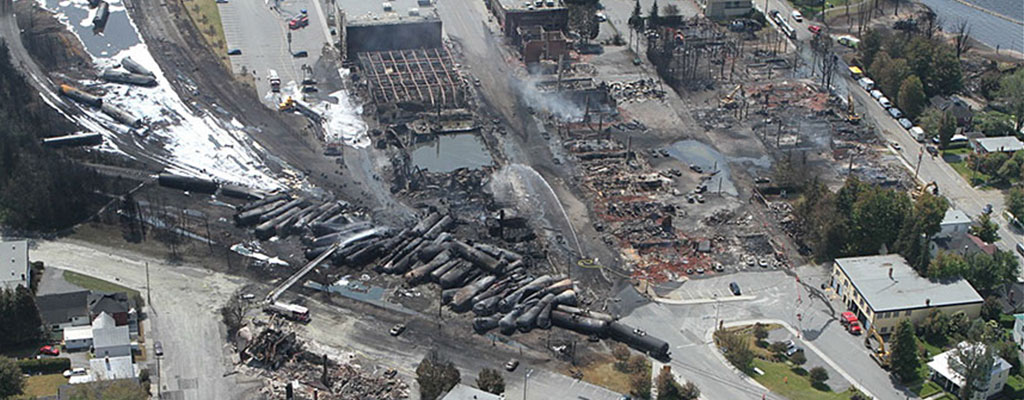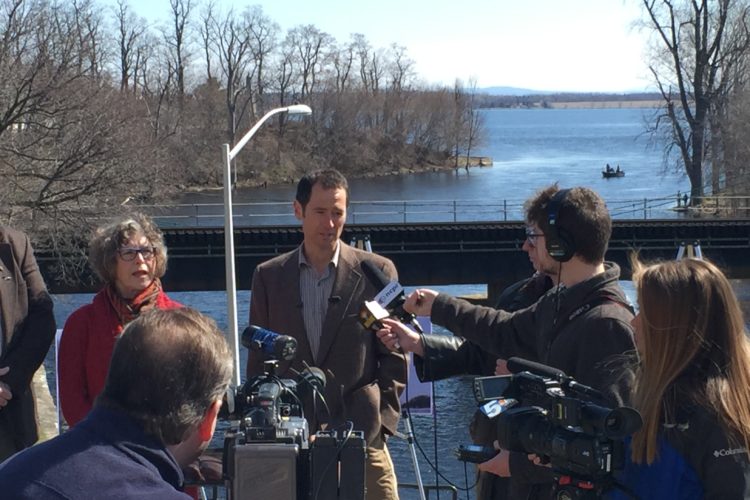We have much more to do and your continued support is needed now more than ever.
Reckless Risk on Our Rails: Call for Oil Train Transport Ban

The National Wildlife Federation, its affiliates, Environmental Advocates of New York and Vermont Natural Resources Council, and partners assembled more than 80 organizations, businesses, legislators, community leaders, and cities — including Burlington, Vermont and Plattsburgh, New York — to sign a letter to the Vermont and New York congressional delegations calling for a federal ban on oil train transport from Montreal, Quebec to Albany, New York.
This ban seeks to end the all-risk, no-reward transportation of explosive oil along the shores of Lake Champlain and the Hudson River. This transport over aging tracks and bridges – which date between the Civil War and the Eisenhower Administration – threatens wildlife, communities, and the economic vitality of the region.
Question of When, Not If

These trains are the same type of trains carrying the same explosive Bakken crude oil that caused the horrifying tragedy in Lac-Mégantic, Quebec in July of 2013. On a summer night, a 72 car train broke loose and derailed in downtown Lac-Mégantic. The ensuing explosion and spill killed 47 people and pollutes the lake to this day. Scientists recently found that fish populations in waters surrounding Lac-Mégantic have plummeted by 66% since the spill, while about 50% of all fish collected exhibit external deformities.
Many of the trains rolling along the tracks in New York are twice as long the train that was responsible for the Lac-Megantic disaster.
At a press event held to announce the sending of the letter held near the rail line in downtown Plattsburgh, New York, NWF Senior Counsel Jim Murphy said:
In fact, there’s tens of millions of gallons that roll along the lake each week. We’ve seen a precipitous increase in oil by rail accidents over the last three years. There’s been at least 200 accidents in the U.S.
Fortunately, many of the accidents mentioned by Jim happened in rural areas where oil spills or enormous mushroom cloud explosions spared the lives of many. Nevertheless, multicar derailment and explosion in places like North Dakota, Virginia, West Virginia and Ontario make clear that as long as the oil trains are on the tracks, it is a question of when, not if, a tragedy will visit the area.

Call for Action
The letter asks Vermont and New York Senators and Congress members to take federal action to address the risky oil trains. City of Plattsburgh Councilor Rachelle Armstrong pointed out that:
We need to stand up and become the advocates in a bold and aggressive way, so that we bring the attention to bear on this issue that our leaders at the federal level need to recognize this is a matter weighing the human needs and all life consequences if there were to be a derailment.
Lake Champlain Committee Executive Director Lori Fisher has stressed that the tanker cars used, “are not fit to carry” crude oil safely. This reference is to DOT-111 tanker cars (often referred to as “Pepsi cans on wheels”). But even updated tanker cars still rupture during derailment accidents.
The threat to the region cannot be overstated. Lake Champlain and the Hudson River provide drinking water for hundreds of thousands of people, $10 billion in annual tourism economy, habitat for more than 110 fish species and 300 bird species, and culture and recreation dating back centuries. The oil trains also place lives in scores of communities at risk.
We need to use our rail infrastructure to benefit our communities. Our rail infrastructure should be a tool to get us off oil — not to make us more dependent on oil. The time to act is now. This region doesn’t need the oil, and it doesn’t need the risk.
Please join us in taking action by retweeting the tweet below:
Time for NY and VT to protect habitat in Lake Champlain and Hudson River from #DirtyOil. https://t.co/99lbJqIyUd pic.twitter.com/evSy8UzDGE
— Wildlife Action (@wildlifeaction) April 22, 2016





















